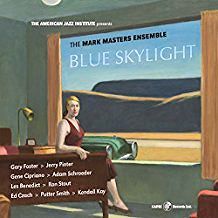 BUY NOW AmazonUK AmazonUS |
The Mark Masters Ensemble Blue Skylight
|
Monk, Bunk And Vice Versa
Out Back Of The Barn
So Long Eric
Wallflower
Peggy's Blue Skylight
Strayhorn 2
Duke Ellington's Sound Of Love
Apple Core
Eclipse
Birds Of A Feather
Motel
Gary Foster (alto saxophone); Jerry Pinter (tenor and soprano saxophones); Gene Cipriano (tenor saxophone 2, 4, 6, 8, 10, 11); Adam Schroeder (baritone saxophone 2; 4; 6; 8; 10, 11); Ron Stout (trumpet 1, 3, 5, 7, 9); Les Benedict (trombone 1,3,5,7,9); Ed Czach (piano); Putter Smith (bass); Kendall Kay (drums)
Recorded April 2015, Tritone Studio, Glendale, CA
Arranger and composer Mark Masters draws together the music of the two Ms in this 11-track disc; Mingus and Mulligan. The result is a consistently enjoyable set in which almost half the tracks – those composed by Mingus - see the substitution of tenor sax Gene Cipriano and baritone Adam Schroeder by trumpeter Ron Stout and trombonist Les Benedict. Thus, the two differential ensembles are made clear; the resultant ensembles – saxes for Mulligan, brass for Mingus - reflect the original inspiration.
Simply replicating originals would not exert anything more positive than admiration for technique and simple absorption. The play of arranging sensitivity, ensemble colour and voicing, and incisive soloing must all coalesce into a seamless whole and in this album that is overwhelmingly what happens. The ‘Mingus’ ensemble is strongly voiced – Monk, Bunk and Vice Versa is excellent in that respect, as Mingus does some stylistic time travelling. It’s Putter Smith’s responsibility to evoke Mingus and his striking playing in So Long Eric shows how adept he is whilst still retaining his own individuality. The tune’s angularity is all the better for the sonorous means by which it’s put across. Smith does have a habit of doing a Slam Stewart now and then, murmuring along with his own solos – it adds another voice to the ensemble and he doesn’t do it badly though it’s not something I happen to like very much. It’s certainly at its least impressive in Eclipse.
Perhaps though it’s the six Mulligan tracks that best reflect Masters’ stylistic rapport. Here he has four sax voices to write for, and his layering is excellent and pianist Ed Czach sounds thoroughly at home inOut Back of the Barn. The reverie-like romanticism of Wallflower - with the subtle percussive wash provided by Kendall Kay and the rich sax voicings behind Czach’s lyric stylings adding to its depth – represent something of a high point in the album and provide great pleasure. Nor should one overlook Schroder’s Mulligan-evoking baritone lament on Strayhorn 2.
There are numerous enjoyable moments I haven’t had time to mention – such as splendid timbres cultivated in Mingus’ Duke Ellington’s Sound of Love, or Jerry Pinter’s soprano sax playing in Birds of a Feather – but you can discover them yourself. This is a thoughtful and inventive album, immaculately recorded.
Jonathan Woolf